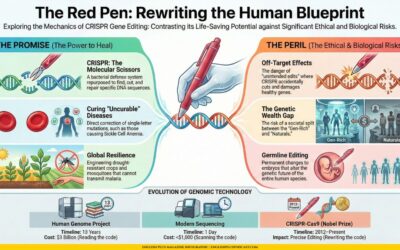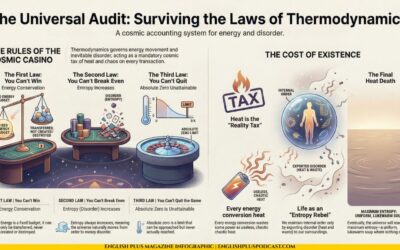Audio Episode
Video Episode
Introduction
Imagine if you could hold a book that contains the entire story of your existence—every chapter, every plot twist, every trait that makes you, well, you. What if I told you that we’ve already cracked the code to this book? Genome sequencing has made it possible to read the ultimate manuscript of life, the genetic blueprint that defines every living organism on Earth. But here’s the kicker: what do we do with this knowledge? Can we rewrite parts of the book? Should we? And what if, in doing so, we accidentally mess up the plot? Stick around, because we’re diving into the fascinating, sometimes controversial, and incredibly cool world of genome sequencing.
Let’s Talk
Let’s take a moment to appreciate how mind-blowing it is that we can decode our DNA. DNA—the famous double helix—is like a 3-billion-letter code that spells out everything about you. Genome sequencing is the technology that allows scientists to read this code. Think of it as the Google Translate for life’s language. But here’s where it gets interesting: unlike Google Translate, this isn’t just about understanding the words. It’s about understanding their meaning.
Now, before you start imagining your DNA as a literal book on a shelf, let’s clarify something: genome sequencing isn’t some magic trick that instantly explains everything about you. It’s more like being handed a library of really technical books and having to figure out what they all mean. For example, we can identify genes that might make you more prone to diseases like cancer or diabetes. Sounds great, right? But knowing you’re at risk doesn’t always mean we can prevent it. That’s like reading the weather forecast saying, “Rain tomorrow,” and still getting caught without an umbrella because you forgot to check the time.
But here’s the ethical question: if we can read the code, should we edit it? Gene editing tools like CRISPR have already made this possible, but playing God comes with responsibilities. Imagine you could “fix” a gene to prevent a disease. That sounds noble, but what if people start editing genes to make their kids taller, smarter, or—dare I say it—better at karaoke? It’s a slippery slope from curing diseases to designing humans.
And then there’s the practicality of it all. Genome sequencing isn’t exactly cheap, although costs have dropped significantly over the years. It started as a billion-dollar venture for one genome. Now, it’s under a thousand dollars for a person’s entire genetic blueprint. That’s like going from buying a Ferrari to grabbing a decent secondhand car. But even at that price, it’s not accessible to everyone. Imagine the inequalities this could create—some people having access to life-altering information while others don’t.
Here’s a fun real-life application: genome sequencing isn’t just for humans. We’re using it to improve agriculture. Scientists are identifying genes in crops that make them more resistant to drought or pests. It’s like giving plants their own superhero powers, except their capes are invisible. And during the COVID-19 pandemic, sequencing was used to track the virus’s mutations, giving us a fighting chance to develop vaccines.
But let’s bring this back to you. How would you feel if someone offered to sequence your genome? Would you want to know everything about your genetic risks, or would ignorance be bliss? It’s like peeking at the ending of a novel before you’ve read the first chapter. For some, it’s empowering. For others, it’s terrifying.
Let’s Learn Vocabulary in Context
Let’s start with “genome sequencing.” It’s the process of figuring out the exact order of the 3 billion letters in your DNA. Think of it as spell-checking the ultimate essay. You can use this phrase in real life when talking about scientific breakthroughs: “Genome sequencing has revolutionized medicine.”
Next, we have “genetic blueprint.” It’s a fancy way of saying your DNA is like a set of architectural plans for your body. You might say, “Our genetic blueprint determines traits like eye color and height.”
How about “CRISPR”? It’s a gene-editing tool that’s basically the DNA version of a word processor. It lets scientists cut and paste genes with precision. You could say, “CRISPR could potentially cure genetic diseases, but it’s not without controversy.”
Then there’s “playing God.” This phrase means taking control over something that’s naturally out of human hands, often with ethical implications. Imagine saying, “Some people think gene editing is like playing God.”
We can’t skip “slippery slope.” This refers to an action that seems harmless at first but could lead to serious consequences. “Allowing designer babies could be a slippery slope.”
“Genetic predisposition” is another good one. It means you’re more likely to develop a certain condition based on your genes. For example, “She has a genetic predisposition to diabetes.”
What about “superhero powers”? While this is a bit playful, it works well to describe enhancements, like those given to crops. “Genome sequencing can give plants superhero powers against pests.”
Let’s talk about “inequalities.” This word refers to unfair differences between people. You might use it like this: “Genome sequencing could create inequalities in healthcare access.”
And don’t forget “mutations.” These are changes in the DNA sequence that can be harmful, beneficial, or neutral. “Scientists tracked the virus’s mutations to develop better vaccines.”
Finally, “ignorance is bliss.” This phrase suggests that sometimes, not knowing something is better. “When it comes to genetic risks, some people believe ignorance is bliss.”
Now, let’s reflect on these words. What’s one way you could use “genetic blueprint” in a conversation about your family’s traits? Or how would you explain “slippery slope” to someone skeptical about gene editing?
Let’s Discuss
- If you could sequence your genome, would you want to know everything about your genetic risks? Why or why not?
- Do you think gene editing should be used to enhance traits like intelligence or athletic ability, or should it be limited to curing diseases?
- How do you feel about the idea of genome sequencing becoming widely accessible? Would it create more opportunities or more inequalities?
Let’s Play & Learn
Flashcards & Much More
Make sure you play all modes available to maximize your retention of these new words and phrases.
Crossword Puzzle
All the words you need to complete the crossword puzzle can be found in the episode above. Enjoy!
Word Search
All the words within the word search activity are taken from the episode above.
Genetics and Genome Sequencing Quiz
Test your knowledge on genetics and genome sequencing with this fun quiz!











0 Comments